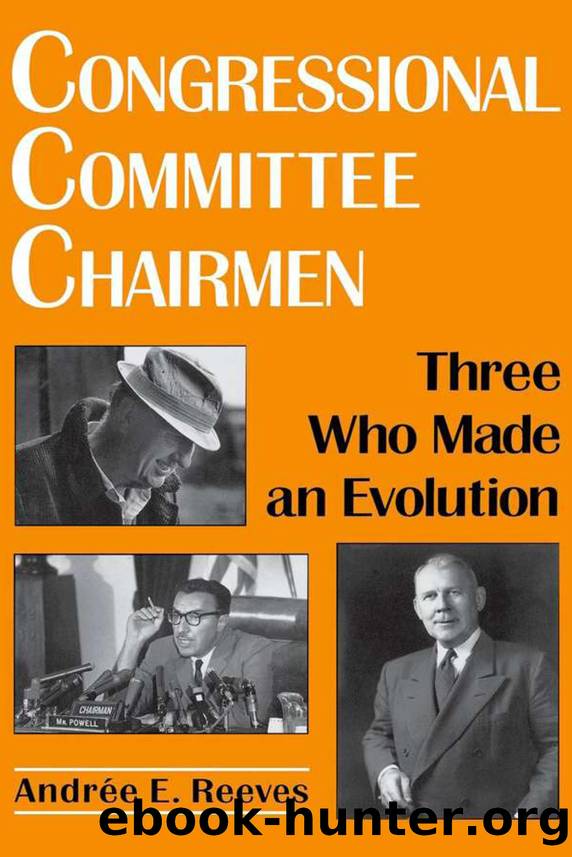Congressional Committee Chairmen by Reeves Andrée E.;Reeves Andrée E.;

Author:Reeves, Andrée E.;Reeves, Andrée E.; [Andrée E. Reeves]
Language: eng
Format: epub
Publisher: University Press of Kentucky
Published: 2021-08-15T00:00:00+00:00
Powellâs Legal Difficulties
Powellâs troubles with the law did little to aid his reputation in Congress.8 He flouted authority left and right throughout all his legal troubles, ignoring court orders and claiming ignorance or poverty. First, two of his aides and a congressional secretary were indicted for tax evasion. When Powell was called to bring his financial records and to testify at the trials of the two aides, he claimed that all the records had been destroyed in a fire at the Abyssinian Baptist Church and that he knew nothing of any improprieties that might have occurred. Subsequently, the indictments against one of the aides were dropped. The other was convicted and sentenced to a year in prison and payment of a one-thousand-dollar fine in 1956. His secretary, who had worked at the church for years, stood accused of receiving a congressional salary after she had returned to Harlem. She was charged with kicking back her salary to Powell between 1948 and 1952 and was convicted and sentenced to prison for seven months. The investigation focused on Powell, but no concrete evidence against him could be found.
The governmentâs investigation of Powell was now public knowledge. He finally was indicted for tax evasion in 1958. He allegedly prepared false returns for his wife, Hazel Scott, who was not charged, and underreported both their earnings. But in January 1960 the indictments against Powell were dismissed. Hamilton (1991, 340) noted the seeming coincidence that on the same day that the administration announced its decision to drop its tax case against him, Powell uncharacteristically announced his decision not to pursue his antisegregation amendment on school aid legislation, thus removing a major stumbling block to the presidentâs agenda.
The third legal difficulty adding to his image problems stemmed from a 1963 judgment in a libel suit brought by Mrs. Esther James, a black domestic, whom Powell had referred to in a televised interview as a âbag womanâ (i.e., graft collector) for the police department in Washington Heights, New York. Powell claimed that he was only providing information to his constituents and claimed congressional immunity from prosecution. He was convicted of libeling Mrs. James, and the jury set damages at more than two hundred thousand dollars, of which the bulk was for damaging the plaintiffâs reputation and earning power. Powell refused to pay and was cited for contempt of court. He could not be arrested because of congressional immunity while the Congress was in session. In New York, it was illegal to serve a civil summons on Sunday. Hence, he returned to his district only on Sundays to deliver his sermon at the Abyssinian Baptist Church. Mrs. James had great difficulty in getting her money, because Powell no longer received a salary from the church or had property in his own name in the state. His house in Puerto Rico was in his wifeâs name and his congressional salary could not be garnished.
Again he was held in contempt of court for nonpayment and nonappearance. He was served with a criminal summons one Sunday outside of his Harlem church.
Download
This site does not store any files on its server. We only index and link to content provided by other sites. Please contact the content providers to delete copyright contents if any and email us, we'll remove relevant links or contents immediately.
The Secret History by Donna Tartt(16718)
The Social Justice Warrior Handbook by Lisa De Pasquale(11506)
Thirteen Reasons Why by Jay Asher(7833)
This Is How You Lose Her by Junot Diaz(5829)
Weapons of Math Destruction by Cathy O'Neil(5079)
Zero to One by Peter Thiel(4867)
The Myth of the Strong Leader by Archie Brown(4809)
Promise Me, Dad by Joe Biden(4478)
Beartown by Fredrik Backman(4464)
How Democracies Die by Steven Levitsky & Daniel Ziblatt(4447)
Stone's Rules by Roger Stone(4438)
The Fire Next Time by James Baldwin(4372)
100 Deadly Skills by Clint Emerson(4106)
A Higher Loyalty: Truth, Lies, and Leadership by James Comey(4059)
Rise and Kill First by Ronen Bergman(4043)
The David Icke Guide to the Global Conspiracy (and how to end it) by David Icke(3913)
The Farm by Tom Rob Smith(3894)
Secrecy World by Jake Bernstein(3807)
The Doomsday Machine by Daniel Ellsberg(3758)
